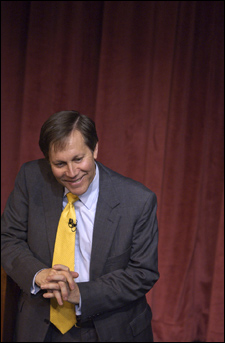Good news from NEA’s Dana Gioia
Bush budget asks $18 million increase for NEA
For Dana Gioia, chairman of the National Endowment for the Arts (NEA), the culture wars are a thing of the past.
Appointed to the NEA’s leadership post in January 2003, the poet, critic, and former business executive wants to move beyond the struggles that once raged over public funding for controversial figures like photographer Robert

Mapplethorpe and initiate a new public conversation about arts funding.
“I refuse to believe that arts funding is controversial. I believe that most Americans want art in their communities and in the lives of their children, and I’m frankly bored with talking about controversies of the previous century.”
Gioia spoke Feb. 9 at Radcliffe’s Agassiz Theatre, outlining an exciting set of initiatives, including a plan to bring high-quality Shakespeare productions to communities throughout the nation, a program to recognize and showcase America’s living jazz masters, and a series of tours and exhibitions to celebrate America’s cultural legacy across all the arts.
Even more exciting is the fact that the NEA will have the funds to support these new programs. President Bush’s 2004 budget requests an $18 million increase in the endowment’s funding, the largest increase since 1984.
Relaxed and engaging with an understated sense of humor, Gioia began by speaking about his own background. The child of a Sicilian father and a Mexican mother, he grew up in a working-class neighborhood in Los Angeles and realized at an early age that literature engaged him at a deeper level than it did most of his peers.
He began writing poetry as a student at Stanford, then came to Harvard where he earned an M.A. in comparative literature in 1975. He said that at Harvard he enjoyed “the two best intellectual years of my life,” learning from such figures as Robert Lowell, Elizabeth Bishop, Northrup Frye, and Octavio Paz. Once out of graduate school, however, he faced the problem of earning a living.
“My parents were wonderful working-class people, but they had failed to provide me with an independent income.”
Choosing between law school and business school, he opted for the latter, observing that he was probably “the first person in human history who went to business school to become a poet.”
Unconventional as it was, the scheme paid off in both areas. Gioia went to work for General Foods, eventually rising to vice president. Meantime, writing at night and on weekends, he has produced three books of poetry, of which the most recent, “Interrogations at Noon,” won the 2002 American Book Award. He has also published a widely read literary anthology and several books of criticism, including the 1991 “Can Poetry Matter?” in which he brought attention to the increasing insularity of the poetry community.
Discussing the changes he planned to make at the NEA, Gioia said that while the agency has made 120,000 grants to artists and arts organizations since its inception in 1965, most of those grants are invisible to everyone except the recipients.
“So the only ones that people know about are the ones that are controversial,” he said.
To counter this tendency, he plans to “create visible national programs of indisputable artistic merit.” The NEA’s initial major effort in this direction will be the national program, “Shakespeare in American Communities,” slated to be the largest tour of Shakespeare in United States history.
Gioia said that he currently has eight major theatrical companies signed up for the tour and expects to have 28 in the near future. They will mount productions of Shakespeare’s plays in high schools, university theaters, and on military bases.
“By the time we’re finished, we will have brought Shakespeare productions to over 1 million high school students. For many of them, it will not only be their first Shakespeare performance, but their first experience of a live, spoken drama.”
Regarding the NEA’s Jazz Masters program, Gioia said that while jazz is “one of the greatest expressions of American imagination and one of the foremost American contributions to the arts, it is becoming more and more of a coterie art form.”
By giving an annual award to a living jazz master, as well as promoting jazz through concert tours and radio shows, Gioia hopes to remind Americans of this unique legacy.
Similarly, the NEA’s American Masterpieces program will bring examples of American achievements in the visual arts, dance, music, and theater to a larger audience.
“The arts are not a luxury,” said Gioia. “They’re not something to be cut whenever the budget is in trouble. If we don’t educate kids in the arts, they will not be fully educated. Arts education is the most important challenge we face. Otherwise, where is the next generation of artists and audiences to come from?”




